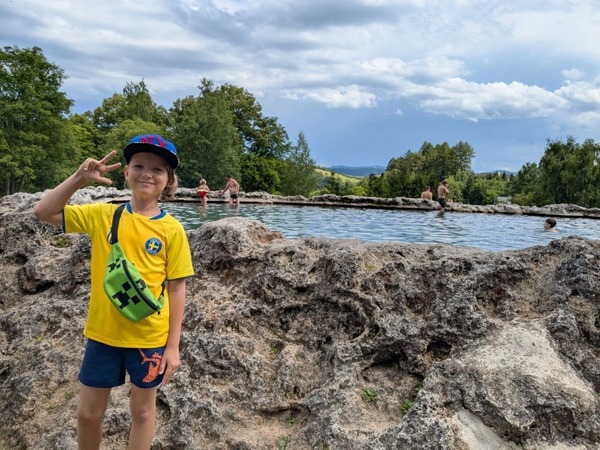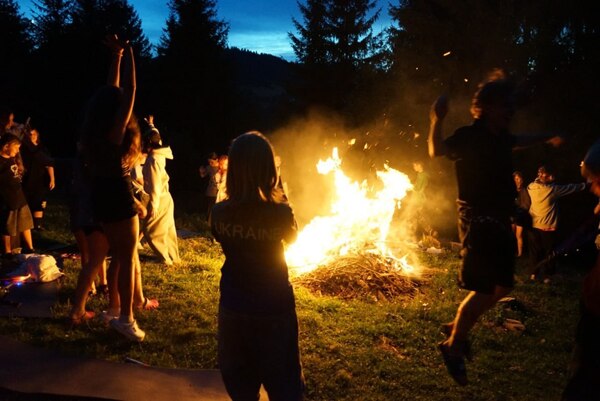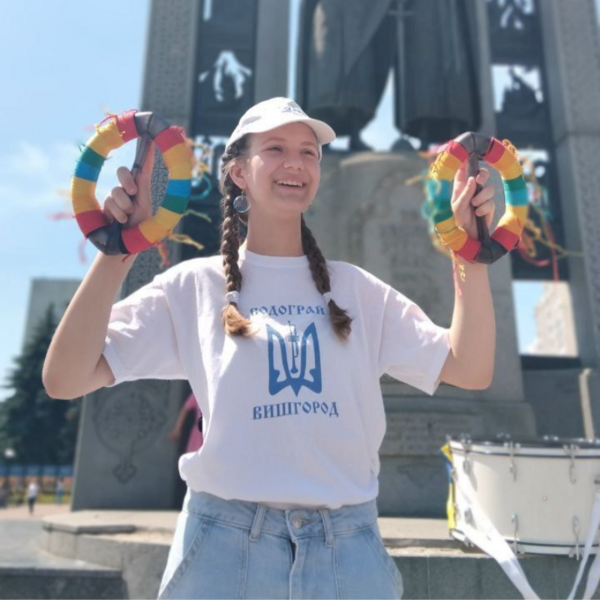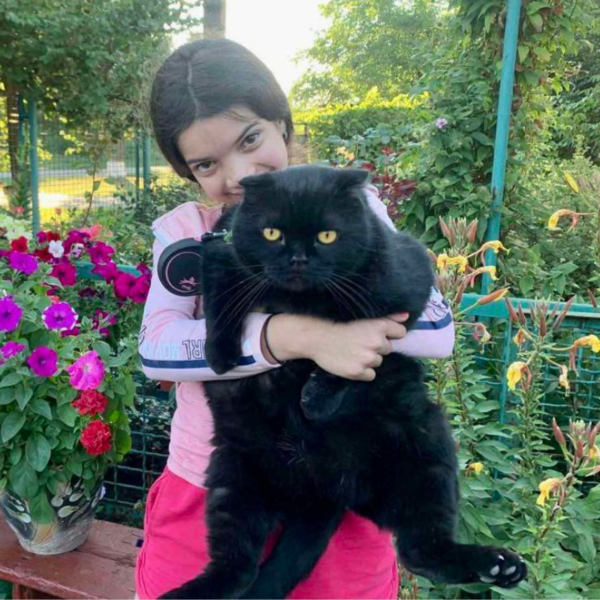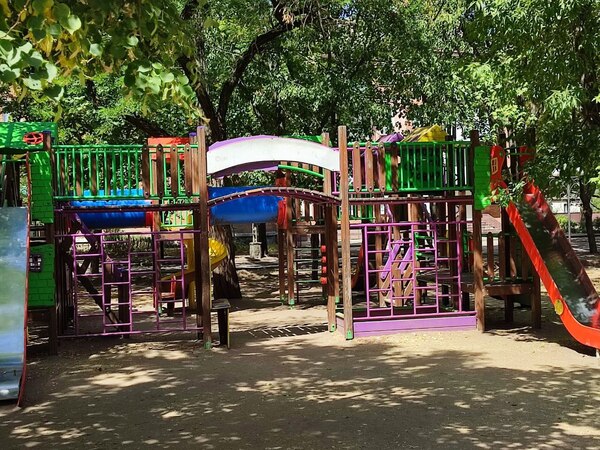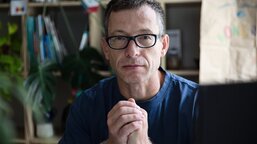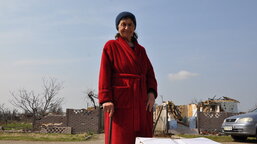Childhood in Ukraine has now unfolded under the shadow of war for three consecutive years. Despite the ongoing conflict, children strive to experience summer like their peers elsewhere in the world – playing, travelling, creating, and dreaming. Yet their stories are shaped by anxiety, separation, and the daily threat of air raids. Several children and parents from different regions of Ukraine shared how they spent their summer holidays and what they experienced. Many of them have benefited from the services of Caritas Czech Republic in Ukraine or are actively cooperating with the organisation.
Sheltering from rockets and escaping Kyiv to grandmother’s house
Ten-year-old Klym lives with his family near Kyiv, in Vyshhorod. His home in Donetsk was destroyed by Russian forces even before he was born. Following the onset of the Russian invasion, the family briefly fled abroad but eventually returned. This year, Klym welcomed a baby sister into the family. “My holidays were unusual,” Klym recounts. “At night, we hid from drones and rockets in the hallway. During the day, I went swimming, practised karate, and helped my parents take care of the baby. I enjoyed the scout camp the most – it was a real adventure. I even learned how to give first aid,” he says proudly. He misses his relatives, whom he has not seen in a long time, as they live in different parts of the country.
Valeria, mother of three-year-old Davyd, lives in Kyiv, where she works as a journalist and radio presenter. As she spent most of June and July with her son in a shelter, she decided to send him to his grandmother in the Lviv region for the summer. “It breaks my heart not to be with my little boy, but I wanted him to have a peaceful and carefree holiday,” Valeria explains. At his grandmother’s house, Davyd plays in the garden pool and enjoys outings with friends. On one occasion, they visited a water circus, where he received a neon magic wand. “He told me it was the best thing he had ever experienced,” his mother says. She thinks of him every day and regrets that they cannot be together. The thought that he is in good hands brings her comfort. When she brings him back to Kyiv, they plan to take a boat trip to the zoo. At home, a surprise awaits him: a Paw Patrol suitcase, a cap iwth Skye, and a T-shirt with Marshall.
Camps, orchestra in Greece, and catching up on studies
Svitlana, mother of twelve-year-old Oleksandra, has experienced two forced evacuations with her family – first in 2014 from occupied Donetsk, and again in 2022, and they finally settled in Uzhhorod. Oleksandra’s father now serves in the army, while she lives with her mother in western Ukraine. “War leaves its mark on everything – people, land, communities, and memories. It affects our children and tries to steal their childhood,” Svitlana says. This summer, Oleksandra chose to attend a camp in the Ivano-Frankivsk region, where she met peers from across the country. “It was the most beautiful feeling – seeing ‘children of war’ laughing, hugging, and rejoicing. For a moment, they had their childhood back,” Svitlana adds.
Sixteen-year-old Sofie from the Kyiv region feels that the war has frozen time. Nevertheless, she has chosen to live fully. She devotes herself to music, drawing, and volunteering. “This year, I travelled with the orchestra to Greece for the first time. We performed Ukrainian compositions on Mount Olympus. I was proud to show the world who we are,” Sofie says. In addition to music, she is preparing for entrance exams and helps make camouflage nets or organises summer camps for children at the local church. “War has taught me that even though the world is fragile, one can still do what they love,” she reflects.
Amira, an eighth-grade pupil from Mykolaivka in the Dnipropetrovsk region, spent the summer at home with her family. She drew, read books, rode her bicycle, played badminton, and studied. “I was lucky that our school, with the help of Caritas Czech Republic, organised lessons in my favourite subjects,” she says enthusiastically. She often thinks of a quote by Honoré de Balzac: To achieve your goal, you need only one thing – to keep going. “And I keep going,” she says. Footballer Veronika, who lives in Shakhtarsk and studies at the Mykolaiv Lyceum, also shared her summer experiences. She actively plays sports and spent part of her holidays in Odessa – by the sea and at a football camp. Milena, who also moved to Mykolaivka, spent her free time drawing, reading, and walking by the river.
Diana, on the other hand, enjoyed her summer in several places. In Dnipro, she was captivated by the theatre performance Forest Song, which transported her to a magical forest where anything is possible. She and her parents also enjoyed the local beach and swimming. In Poltava, they admired elegant facades, narrow streets, and majestic squares. The peaceful city radiated calm, warmth, and serenity. Diana spent part of her holidays studying to catch up on Ukrainian language and mathematics. Occasionally, she had to run to a shelter due to air raid alerts. Most explosions were heard from a distance, except for one when the Russian army attacked a nearby farm. Despite everything, Diana feels happiest at home.
Going outside near the frontline is dangerous for children
Olga, a Ukrainian language teacher from Nikopol in southern Ukraine, lives just four kilometres from the combat zone. The Russian army has been shelling the city since summer 2022. She is grateful for every child who can spend the summer in a safer area. She regrets that most of her pupils remain confined at home, often due to safety concerns and parental fear. Their only entertainment is the internet and life in the online world.
Ukrainian children live through summer in stark contrasts: between swimming in pools and hiding in shelters, between theatre performances and air raid sirens. Their stories reveal immense resilience – and also that every opportunity for a camp, trip, or meeting with peers is priceless. It allows them, even if only briefly, to be children again. And in times of war, that is the greatest gift of all.
Caritas Czech Republic in Ukraine
Caritas Czech Republic has been helping Ukrainian families since the beginning of the war. In addition to providing much-needed humanitarian aid, we provide shelter to internally displaced people in modular houses in western Ukraine. We are also improving living conditions in dormitories. In addition to the temporary accommodation centre in Berehovo, our team has set up three more locations for war-affected Ukrainians this year: in the village of Kernitsa in Lviv Oblast, the village of Serednie in Zakarpattia Oblast, and in Ivano-Frankivsk. We keep on providing the most vulnerable people with decent living conditions.
In western Ukraine, we support Ukrainians who have decided to stand on their own feet after evacuating from the war zone. Through mini-grants, we assist the restoration of livelihoods for people in Lviv, Ivano-Frankivsk, and the Transcarpathian region.
In eastern Ukraine, we improve the accessibility and quality of rehabilitation and reproductive medicine by modernising hospitals and educating staff.
Since 2025, in cooperation with the Ministry of Health of Ukraine, we have been involved in setting up a network of Mental Health Centres in 4 regions: Dnipro, Lviv, Ivano-Frankivsk, and Transcarpathia. In addition, Caritas Czech Republic supports Ukrainian educational institutions near the frontline by creating safe educational spaces, providing equipment, and funding psychological consultations and additional classes to help children catch up on their educational gaps.
In southern Ukraine, we are now working with partners to restore the water supply in affected areas and set up mobile medical centres.


